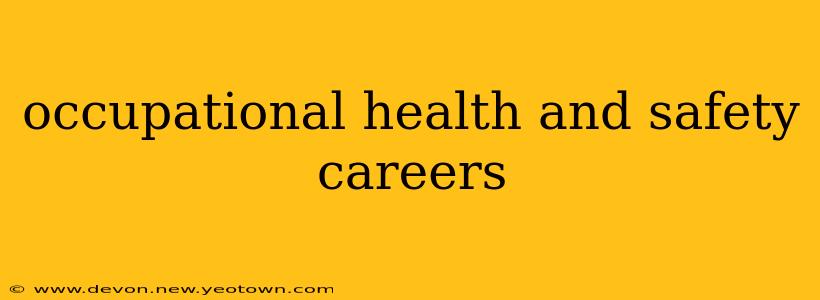The world of work is constantly evolving, but one thing remains constant: the critical need for a safe and healthy workplace. That's where occupational health and safety (OHS) professionals step in – the guardians of workplace well-being. This isn't just about putting up safety signs; it's about proactively identifying and mitigating risks, fostering a culture of safety, and ultimately saving lives. If you're drawn to a career that blends problem-solving, advocacy, and a genuine desire to make a difference, then OHS might be your perfect fit.
Let's delve into this rewarding field, exploring the diverse career paths available and answering some frequently asked questions.
What are the different types of jobs in occupational health and safety?
The OHS field isn't a monolithic entity. It encompasses a wide range of roles, each demanding unique skills and responsibilities. Some popular career paths include:
-
Safety Officer/Manager: These professionals are the frontline defenders of workplace safety. Their days are filled with inspections, risk assessments, incident investigations, and developing and implementing safety programs. They often work across various industries, from construction to manufacturing to healthcare.
-
Health and Safety Consultant: These experts provide independent advice and guidance to organizations, helping them navigate complex safety regulations and build robust safety management systems. They often specialize in specific industries or hazards.
-
Ergonomist: Ergonomists focus on the design and arrangement of workplaces to minimize physical strain and promote employee well-being. They analyze tasks, recommend equipment modifications, and train employees on proper posture and lifting techniques.
-
Industrial Hygienist: These professionals identify and control workplace hazards, often invisible ones like airborne contaminants, noise, and radiation. They use specialized equipment and analytical skills to assess risks and develop control measures.
-
Safety Trainer/Educator: Training and education are vital components of a strong OHS program. These professionals develop and deliver safety training programs, ensuring employees are equipped with the knowledge and skills to work safely.
-
OHS Auditor: OHS auditors conduct thorough assessments of an organization's safety practices, identifying areas for improvement and ensuring compliance with regulations. Their work is crucial for maintaining high safety standards.
What qualifications do I need for a career in occupational health and safety?
The educational requirements for OHS careers vary depending on the specific role and level of responsibility. Many entry-level positions may require a bachelor's degree in OHS, environmental health, or a related field. However, many professionals also hold certifications such as a Certified Safety Professional (CSP) or similar designations that demonstrate their expertise and commitment to the field. Continual professional development is key, with ongoing training and certifications essential to stay abreast of evolving regulations and best practices.
What is the salary range for occupational health and safety jobs?
Salary expectations in OHS depend on several factors, including experience, education, location, and the specific role. Entry-level positions typically offer a competitive salary, while experienced professionals and those with specialized skills can command significantly higher incomes. Researching salary data in your specific region will provide a more accurate estimate.
Is there a lot of travel involved in occupational health and safety jobs?
The amount of travel required varies widely depending on the specific job. Some roles, particularly those involving consulting or auditing, may involve frequent travel to client sites. Others, like safety officers in a single location, may have minimal travel requirements. It's essential to clarify travel expectations during the job application process.
What are the career prospects in occupational health and safety?
The outlook for OHS professionals is overwhelmingly positive. With a growing emphasis on workplace safety and a continued focus on worker well-being, demand for skilled OHS professionals is consistently high across various industries. The field is also constantly evolving, with new technologies and challenges requiring adaptation and ongoing professional development.
How can I get experience in occupational health and safety?
Gaining practical experience is crucial for building a successful career in OHS. Internships, volunteer work with safety organizations, and even part-time positions related to safety can provide valuable hands-on experience. Networking with professionals in the field can also open doors to mentorship and job opportunities.
Embarking on a career in occupational health and safety is a commitment to making a tangible difference in the lives of others. It's a field that values both intellectual rigor and a deep sense of responsibility. If you're passionate about creating safer and healthier workplaces, then a career in OHS could be the perfect path for you.

